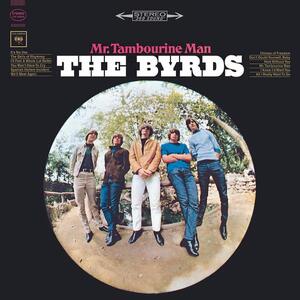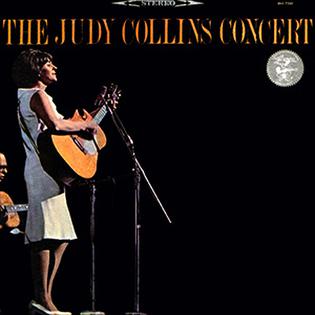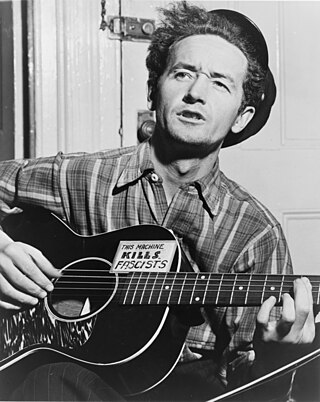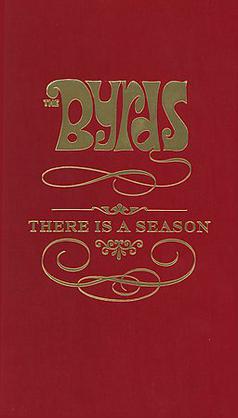
James Roger McGuinn is an American musician. He is best known for being the frontman and leader of the Byrds. He was inducted into the Rock and Roll Hall of Fame for his work with the Byrds. As a solo artist he has released 10 albums and collaborated with, among others, Bob Dylan, Tom Petty and Chris Hillman. The 12-string Rickenbacker guitar is his signature instrument.
"Mr. Tambourine Man" is a song written by Bob Dylan, released as the first track of the acoustic side of his March 1965 album Bringing It All Back Home. The song's popularity led to Dylan recording it live many times, and it has been included in multiple compilation albums. It has been translated into other languages and has been used or referenced in television shows, films, and books.

Mr. Tambourine Man is the debut studio album by the American rock band the Byrds and was released on June 21, 1965, by Columbia Records. The album is characterized by the Byrds' signature sound of Jim McGuinn's 12-string Rickenbacker guitar and the band's complex harmony singing. The material on the album mostly consists of cover versions of folk songs, primarily composed by Bob Dylan, and originals written or co-written by singer Gene Clark. Along with the Dylan-penned single of the same name, Mr. Tambourine Man established the band as an internationally successful act and is widely regarded by critics as representing the first effective American challenge to the chart dominance of the Beatles and other British Invasion bands during the mid-1960s.

Turn! Turn! Turn! is the second studio album by American rock band the Byrds, released on December 6, 1965, by Columbia Records. Like its predecessor, Mr. Tambourine Man, the album epitomized the folk rock genre and continued the band's successful mix of vocal harmony and jangly twelve-string Rickenbacker guitar. The album's lead single and title track, "Turn! Turn! Turn!", which was adapted by Pete Seeger from text in the Book of Ecclesiastes, had previously been arranged in a chamber-folk style by the Byrd's lead guitarist Jim McGuinn for folk singer Judy Collins' third album, but the arrangement he used for the Byrds' recording of the song utilizes the same folk-rock style as the band's previous hit singles.

The Byrds' Greatest Hits is the first greatest hits album by the American rock band the Byrds and was released in August 1967 on Columbia Records. It is the top-selling album in the Byrds' catalogue and reached number 6 on the Billboard Top LPs chart, but failed to chart in the UK.

The Byrds is a four-CD box set by the American rock band the Byrds. It features music that had previously been released between the mid-1960s and early 1970s, along with a number of previously unreleased tracks and some new recordings from 1990. The box set was issued on October 19, 1990, by Columbia/Legacy and reached number 151 on the Billboard albums chart.

Live at the Fillmore — February 1969 is a live album released by the American rock band the Byrds in 2000 on Columbia/Legacy. Compiled from two performances at the Fillmore West on February 7 and 8, 1969, the album includes several songs that are not found on any of the group's studio albums.

The Essential Byrds is a comprehensive two-CD compilation album by the American rock band the Byrds. It was released in 2003 as part of Sony BMG's The Essential series. The Essential Byrds did not chart in the U.S. or the UK. A 3.0 edition of the compilation released in 2011 contains a third disc with six additional tracks: "Spanish Harlem Incident", "I Knew I'd Want You", "The World Turns All Around Her", "I See You", "Change Is Now", and "One Hundred Years from Now".
Americana is an amalgam of American music formed by the confluence of the shared and varied traditions that make up the musical ethos of the United States, specifically those sounds that are emerged from the Southern United States such as folk, gospel, blues, country, jazz, rhythm and blues, rock and roll, bluegrass, and other external influences.
Eric Weissberg was an American singer, banjo player, and multi-instrumentalist, whose most commercially successful recording was his banjo solo in "Dueling Banjos", featured as the theme of the film Deliverance (1972) and released as a single that reached number 2 in the United States and Canada in 1973.
"Turn! Turn! Turn!", also known as or subtitled "To Everything There Is a Season", is a song written by Pete Seeger in 1959. The lyrics – except for the title, which is repeated throughout the song, and the final two lines – consist of the first eight verses of the third chapter of the biblical Book of Ecclesiastes. The song was originally released in 1962 as "To Everything There Is a Season" on the folk group the Limeliters' album Folk Matinee, and then some months later on Seeger's own The Bitter and the Sweet.

Whales & Nightingales is the eighth studio album by American singer and songwriter Judy Collins, released by Elektra Records in 1970. It peaked at No. 17 on the Billboard Pop Albums chart.

The Judy Collins Concert is a 1964 live album by American singer and songwriter Judy Collins, which included combined traditional folk material with songs by Bob Dylan and Tom Paxton. It was recorded on March 21, 1964 at the Town Hall in New York City.

The American folk music revival began during the 1940s and peaked in popularity in the mid-1960s. Its roots went earlier, and performers like Josh White, Burl Ives, Woody Guthrie, Lead Belly, Big Bill Broonzy, Richard Dyer-Bennet, Oscar Brand, Jean Ritchie, John Jacob Niles, Susan Reed, Paul Robeson, Bessie Smith, Ma Rainey and Cisco Houston had enjoyed a limited general popularity in the 1930s and 1940s. The revival brought forward styles of American folk music that had in earlier times contributed to the development of country and western, blues, jazz, and rock and roll music.

There Is a Season is a four-CD and one DVD box set by the American rock band the Byrds that was released on September 26, 2006 by Columbia/Legacy. It comprises 99 tracks and includes material from every one of the band's twelve studio albums, presented in roughly chronological order. The bonus DVD features ten clips of the Byrds lip-synching their hits on television programs between 1965 and 1967. Upon release, the box set failed to reach the Billboard 200 chart or the UK Albums Chart. There Is a Season supplants the band's earlier box set, The Byrds, which was released in October 1990.

The Very Best of The Byrds is a compilation album by the American rock band The Byrds, released by Columbia Records in 1997. Initially the compilation was only released in Europe and Canada but as of 2006, the album has seen some release in the U.S. The album contains a total of 27 songs, arranged in chronological order, that span the first five years of the band's career.
"The Bells of Rhymney" is a song by folk singer Pete Seeger, which consists of Seeger's own music accompanying words written by Welsh poet Idris Davies. Seeger first released a recording of the song on a live album in 1958, but it is the American folk rock band the Byrds' 1965 recording that is the best known version of the song.

History of The Byrds is a double album compilation by the American rock band the Byrds and was released on May 18, 1973 by CBS Records. The compilation was released exclusively in Europe and the UK, peaking at number 47 on the UK Albums Chart, but it was also available in the United States as an import.
"Farewell", also known as "Fare Thee Well", is a song by American singer-songwriter Bob Dylan. Dylan wrote the song in January 1963. He considered it for his third album, The Times They Are a-Changin', but only attempted a few takes during the album's first studio session. Dylan's earlier recordings of "Farewell" found their way onto various bootlegs, and a collection of demos that included the song was released in October 2010 on The Bootleg Series Vol. 9 – The Witmark Demos: 1962–1964.

Golden Folk Hits is an album by American singer Bobby Darin, released in 1963.














